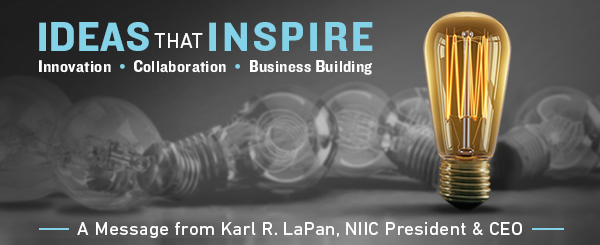11.25.20
Ideas are easy. Courageous dissent, not so much.
Karl R. LaPan, President & CEO, The NIIC

An often-overlooked attribute of a healthy community is the courage of dissent.
Politics teach the way you win is to marginalize dissent. Yet, confident communities tolerate the messiness of disagreement. Dissenters’ views are welcomed as a way to sift ideas, strengthen plans, and avoid costly mistakes.
Constructive dissent is less about resistance. It is more about inviting diverse perspectives and contradictory opinions to the table.
Wise leaders recognize the first idea is seldom the best. Alfred Nobel, the Nobel Prize founder, said, “If I have a thousand ideas and only one turns out to be good, I am satisfied.” It turns out he was an optimist. Current research suggests THREE of every 10,000 new ideas survive to become successful innovations.
Many transformative ideas are superficially attractive and short-lived. That’s okay. It is part of a Darwinian “survival of the fittest” process. It weeds out “so-so” ideas. Constructive dissent ensures the strongest, most viable ideas survive.
Testing ideas through constructive dissent requires great energy. When refining an idea, you can’t skip steps that are difficult or too complicated. “Simple can be harder than complex,” Steve Jobs famously said. “You have to work hard to get your thinking clean to make it simple.”
Constructive dissent is a willingness to abandon well-worn paths to pursue new ones. Dissenters challenge you to revisit assumptions, look in new directions, embrace alternative models, and leave behind “me too” thinking. A senior Disney leader once said: “If you don’t change what you see, what you see doesn’t change.”
Confident communities welcome both courageous ideas and constructive dissent. These are not opposing forces. They are the twin gears that drive innovation. Only creativity paired with dissent can empower communities to resist groupthink and confirmation bias.
“Organizations never die from dissent, but many die from conformity,” wrote Jacob Bronowski, the British mathematician, and historian.
The same goes for communities. Today’s economic development plans too often look like copied versions of other community playbooks. Such copy-cat plans don’t fit local culture, competencies, and character. Buyer beware. These plans often create “boat anchors” and “eyesores” for future generations. “Me, too” communities are no more successful than “me too” companies or products.
Even good ideas, if approved too quickly, can suck the oxygen out of effective decision-making. Confident leaders don’t allow even the best ideas to stifle innovation, cripple creativity, or truncate alternatives.
As Cynthia Rabe warns in her book, Innovation Killers, listening to the same old “experts” leads to conformity. Conformity is the death of innovation.
Conversely, as inclusion expert Annie Jean-Baptiste reflects in her book, Building for Everyone, “new voices (and new combinations of ideas) are the core of innovation.”
Parkview Field was an idea born of constructive dissent — disagreement with then-dominant views about downtown Fort Wayne. Our community listened to new voices, which resulted in a community asset with a viable business model.
Yet, today it would be unwise to impose new conformity of thought based on the success of Parkview Field. Downtown baseball is more than a “symbol of what can happen when people take a chance.” It’s evidence of the value of constructive dissent.
In the future, when we debate the “next generation” of competing resource priorities – which may look like a downtown arena, riverfront development, an innovation district, or similarly large-scale development projects—remember to embrace constructive dissent. It is unwise to marginalize alternative voices as “outliers” or dismiss outright all opposing views.
As we redevelop Fort Wayne for emerging economic realities, we must embrace dissenters who question why some ideas die because of “finite resources” while others ride an “investment runaway train.”
Let’s find the courage to welcome and invite dissent. Like Nobel, let’s recognize it is the only way to weed through 9,999 weak ideas to find the one that will move mountains.
# # #

